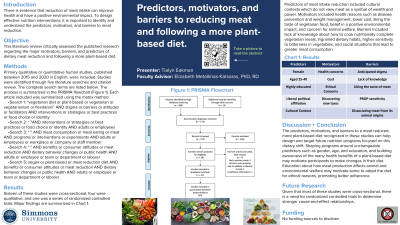Back

Objectives: There is evidence that reduction of meat intake can improve health and have a positive environmental impact. To design effective nutrition interventions, it is important to identify and understand the predictors, motivators, and barriers to meat reduction. This literature review critically assessed the published research regarding the major motivators, barriers, and predictors of dietary meat reduction and following a more plant-based diet.
Methods: Primary qualitative or quantitative human studies, published between 2015 and 2020 and available in English, were included. Studies were identified through a series of five literature searches and citation review. A total of 398 studies were identified, and after excluding duplicates and studies not relevant to the research question, 21 were included in this review. Each article included was summarized using the matrix method.
Results: Sixteen of these studies were cross-sectional, four were qualitative, and one was a series of randomized controlled trials. Predictors of meat intake reduction and shift to eating a more plant-based diet included a more liberal political affiliation, female gender, being 25 to 40 years of age, higher levels of education, and cultural contexts which do not view meat as a symbol of wealth and power. Motivators included health reasons such as disease prevention and weight management, lower cost, liking the taste of vegetarian food, belief in a positive environmental impact, and concern for animal welfare. Barriers to change included anticipated stigma, liking the taste of meat, lack of knowledge about how to cook nutritionally complete vegetarian meals, ingrained dietary habits, higher sensitivity to bitterness in vegetables, and social situations that lead to greater meat consumption.
Conclusions: The predictors, motivators, and barriers to a meat reduced, more plant-based diet recognized in these studies can help design and target future nutrition programs focused on facilitating this dietary change. However, given that most of these studies were cross-sectional, there is a need for randomized controlled trials to determine stronger cause-and-effect relationships.
Funding Sources: None
Food Choice, Markets and Policy
(PO13-09-22) What Are the Predictors, Motivators, and Barriers to Reducing Meat and Following a More Plant-Based Diet?


Tialyn C. Eakman, MS
– Recent Graduate, Simmons University, Billerica, Massachusetts, United States- EM
Elizabeth S. Metallinos-Katsaras, PhD RD
– Chair, Simmons University, Boston, Massachusetts, United States
Presenting Author(s)
Co-Author(s)
Disclosure(s):
Tialyn C. Eakman, MS: No relevant financial relationship(s) with ineligible companies to disclose.
Elizabeth S. Metallinos-Katsaras, PhD RD: No relevant financial relationship(s) with ineligible companies to disclose.
Objectives: There is evidence that reduction of meat intake can improve health and have a positive environmental impact. To design effective nutrition interventions, it is important to identify and understand the predictors, motivators, and barriers to meat reduction. This literature review critically assessed the published research regarding the major motivators, barriers, and predictors of dietary meat reduction and following a more plant-based diet.
Methods: Primary qualitative or quantitative human studies, published between 2015 and 2020 and available in English, were included. Studies were identified through a series of five literature searches and citation review. A total of 398 studies were identified, and after excluding duplicates and studies not relevant to the research question, 21 were included in this review. Each article included was summarized using the matrix method.
Results: Sixteen of these studies were cross-sectional, four were qualitative, and one was a series of randomized controlled trials. Predictors of meat intake reduction and shift to eating a more plant-based diet included a more liberal political affiliation, female gender, being 25 to 40 years of age, higher levels of education, and cultural contexts which do not view meat as a symbol of wealth and power. Motivators included health reasons such as disease prevention and weight management, lower cost, liking the taste of vegetarian food, belief in a positive environmental impact, and concern for animal welfare. Barriers to change included anticipated stigma, liking the taste of meat, lack of knowledge about how to cook nutritionally complete vegetarian meals, ingrained dietary habits, higher sensitivity to bitterness in vegetables, and social situations that lead to greater meat consumption.
Conclusions: The predictors, motivators, and barriers to a meat reduced, more plant-based diet recognized in these studies can help design and target future nutrition programs focused on facilitating this dietary change. However, given that most of these studies were cross-sectional, there is a need for randomized controlled trials to determine stronger cause-and-effect relationships.
Funding Sources: None

.png)
